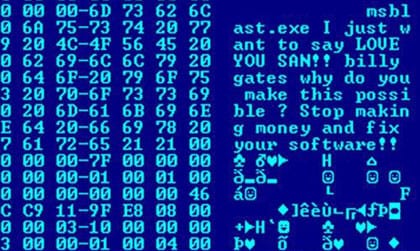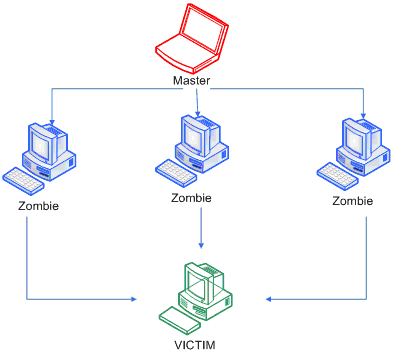Maybe the critics are right... There is a growing concern that we are much too dependent on the Internet for everyday life. And this is not coming from doomsday proponents only. Senior officials in National Security believe that our dependence on the Internet for nearly everything, except breathing, is putting us at significant risk.
Given our current use of the Internet and cloud storage, imagine what would happen if we lost communication or even electricity. What would happen if we had an EMP attack? We would have no access to all the information and assets we have tied in to the Internet and cloud storage facilities.
We would even lose the reference materials with instructions on how to repair the damage. We would literally be plunged into the ‘dark ages’ and it would take years to recover. Some would say that this is crazy talk and that we have nothing to fear. But as history has shown us, there may be some truth in the concerns posed by the critics and security experts.
A little taste of the future, perhaps? While there haven’t been such grave attacks that have affected the entire globe, there have been incidences in the past that have made us realize just how vulnerable we have made ourselves with the increased dependence on the Internet.
Let’s sample a few of the worst Internet disasters, shall we?
#1. SQL Slammer
This was ranked among the worst Internet virus. The SQL Slammer was a worm that got into the Internet through a hole in Microsoft’s SQL server. Standing at only 376 bytes, the worm multiplied itself through a UDP packet causing an exponential infection at a rate of one computer per 8.5 seconds.
The result? All the Internet routers were overloaded and many crashed. This resulted in the slowing down of the entire Internet and denials of online services. Interestingly, there had been a patch developed for that hole in the SQL server six months before this disaster, but many users hadn’t installed it yet. It is estimated that over 22,000 systems were affected globally.
#2. Code Red
Code Red was another computer worm ranked among the worst things that ever happened to the Internet. The distinguishing factor here is that its effects were still being felt in 2011, 10 years after its appearance in July 2001.
The entry point was through a hole in Microsoft’s IIS web server, for which a patch had been made available months earlier. The worm defaced over 359,000 infected websites with a ‘HELLO’ message, and it didn’t stop there. After defacing the sites, Code Red reactivated itself about 3-4 weeks later and launched attacks on the disk operating systems of certain pre-selected IP addresses, which included the White House.
Code Red caused about $2.6 billion in damages and as of 2011, there were still major connectivity disruptions arising from it.
 #3. Direct denial of service (DDoS) attacks
#3. Direct denial of service (DDoS) attacks
Having just sailed through the transition into the new millennium, February 2000 will be remembered as the month that almost destroyed the Internet. A series of deliberate DDoS attacks were launched on several major websites over a number of days.
The attacks affected various sites from ecommerce giants like Amazon, eBay, news sites like CNN.com, and trading websites Datek, among others. The attacks caused disruptions lasting anywhere from 30 minutes to 3 hours, and were so serious that the FBI got involved.
#4. The China Attack
In the middle of 2009, major companies in Silicon Valley experienced one of the worst acts of espionage in apparent peace time. China, under the guise of gathering information on its human rights activists, hacked into the internal networks of companies such as Google and Yahoo, among others, and stole some of their intellectual property.
The attack was afforded by a weakness within the older Internet Explorer and caused Google to cease operations in China. Later, reports revealed that the attack was highly sophisticated and well coordinated, comprising almost a dozen kinds of malware and multiple encryption levels that obscured their activities.
There are reports that the hackers may have accessed sensitive databases with information on surveillance targets and government officials. This has however not been confirmed by Google or the FBI.
#5. The Turkish Take-Over
On Christmas Eve, 2004, TTNet, an internet service provider in Turkey, made the mistake of announcing that the entire Internet should be routed to them. As a result, this single ISP became the entire Internet for a few hours that morning, effectively hijacking the entire world’s Internet traffic.
TTNet made a configuration error which spread through the Internet and resulted in traffic being sent to the wrong destination. This meant that many users could not access certain websites for several hours.
However, this did not raise too much alarm since it was Christmas Eve and the matter was resolved quickly.
#6. The AOL Blunder
August 6, 2006 was a difficult day for AOL users and staff. It was the day when information on web activities of over 650,000 users was posted publicly and distributed over the Internet.
The file was intended for research purposes and it contained over 20 million searches of these users through a period of three months. It was then mistakenly released by the AOL research team on its website from where it was copied and distributed. While there were no names mentioned, there was sufficient information to identify the individuals and match them to their search history.
This gross breach in user privacy was listed as one of the dumbest moments in business and resulted in the resignation of the company’s chief technology officer.
#7. Earthquake darkens Asia
It isn’t just humans that could disrupt the Internet, be it deliberate or not. Nature can also cause some considerable damage and leave populations in ‘Internet darkness’ for weeks.
This is exactly what happened to many Asian countries in December 2006. An earthquake off the coast of Taiwan broke several important communication cables that had been installed on the ocean floor. As a result, countries like Taiwan, Singapore, the Philippines, Malaysia and others were essentially cut off from the rest of the world as far as the Internet was concerned.
It took more than a month for the repairs to be completed, given that they were submarine cables.
Images: Authors own
______________________________________________________________________________
Tweak Your Biz is a thought leader global publication and online business community. Today, it is part of the Small Biz Trends stable of websites and receives over 300,000 unique views per month. Would you like to write for us?
An outstanding title can increase tweets, Facebook Likes, and visitor traffic by 50% or more. Generate great titles for your articles and blog posts with the Tweak Your Biz Title Generator.


 #3. Direct denial of service (DDoS) attacks
#3. Direct denial of service (DDoS) attacks
